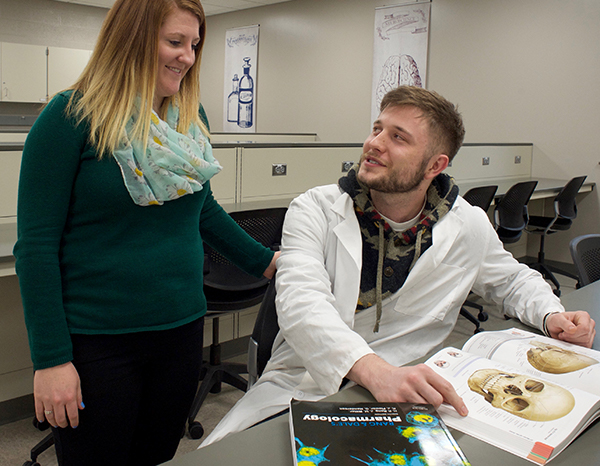
Tyler Bunting decided on a major late in college, choosing biology with an emphasis in conservation and ecology. It wasn’t until the final semester of his senior year when he realized he had a passion for the medical side of biology.
After researching different careers in the medical field, he quickly learned that the courses he had taken for his major weren’t enough to pursue a medical career. Instead of giving up on his passion, Bunting searched for a path that would bridge the gap. The path he chose was the one-year, non-thesis, master’s degree in biomedical sciences.
This unique program in the College of Veterinary Medicine is specifically designed to prepare students for a wide range of career pathways – whether that’s preparation for a career in academia, industry or research, or preparation for professional school or PhD program.
The nine-month, intensive program started with 16 students, under the leadership of biomedical sciences department chair Anumantha Kanthasamy, PhD, and Richard Martin, DVM, PhD, department director of graduate education. Now, in its fourth year with 50 students, it’s the only post-baccalaureate, pre-medical program in Iowa approved by the American Medical Certification Association.
“Eighty-seven percent of our students who apply to professional school are accepted,” said Emma Hashman, coordinator of the master’s program.
“We have graduates who are now in medical, dental, pharmacy and veterinary schools, and several who have enrolled in PhD programs.”
Hashman meets with industry representatives to learn what skills those employers need and incorporates them into the program.
“I credited the knowledge that I learned in the first semester of the program with helping me get a job as a medical scribe,” Bunting said. “The position will give me patient contact hours necessary for medical school admissions.”
“We spend a lot of time reviewing our curriculum to make sure it includes the material and skills that help the program’s graduates be successful whether in industry or professional school,” Hashman says.
Third-year veterinary student Christina Collins (’18) is another program graduate. After getting a bachelor’s in biology with a minor in chemistry, she wanted to further her education before veterinary school, and like Bunting, wanted some work experience before applying to professional school. Collins learned about the program from her academic advisor and enrolled. “The courses in the program really prepared me for professional school,” she said. “I had a much better foundation for many of my first-year veterinary courses than I would have going straight from undergraduate to professional school.”
Preparing students for that first year of professional school is one of the reasons Hashman continues to review and improve the program. “Our program fills a unique gap that many programs don’t,” Hashman said. “Our students get a taste of what professional school will be like.”
With courses geared toward both animal- and human-focused studies, program graduates are prepared to pursue a variety of careers.
“While the program is going to make me a competitive professional school applicant, it’ll also increase the chances for excelling in medical school,” Bunting said. “I give it 10 stars out of 10.”
November 2016
